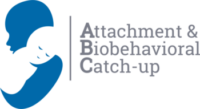Current Research Projects
Current Projects
High-Risk Birth Parents
Children from families who are involved with Child Protective Services (CPS) are at greater risk for developing problems related to their socio-emotional, cognitive, and brain development. In efforts to improve these children’s developmental outcomes, we assessed the efficacy of ABC among parents with CPS. Parents were randomly assigned to either receive ABC or to receive a control intervention of the same duration and frequency. We then followed up with the families when children were ages 1-4 (Time 1) and again when they were ages 8-10 (Time 2).
At Time 1, more of the ABC children developed secure and organized attachments with their parents than children in the control intervention. Additionally, ABC children showed more normative production of cortisol, less expression of negative emotions, and stronger inhibitory control. ABC parents were more sensitive and showed more optimal neural activity than parents in the control group.
At Time 2, ABC children showed greater prefrontal cortex activation in response to photographs of fearful faces compared to children in the control group. This suggests that ABC children had better regulation to threat at the level of brain activation. ABC children also reported more secure relationships with their parents, showed more normative cortisol production, and showed more optimal autonomic nervous system functioning than children in the control group.
These children are now entering adolescence, a period of particular vulnerability for the emergence of mental health problems due to increasing demands for regulation of emotions and behaviors, coupled with on-going development of neural circuits that support emotional and behavioral regulation. We will be seeing them at ages 13, 14, and 15 and measuring their inhibitory control, emotion regulation, peer relations, and physiological regulation at the level of brain activation and circuitry and at the behavioral level. We expect ABC adolescents to show different patterns of brain activation and better regulation of emotions, behaviors, and physiology than adolescents whose parents received the control intervention.
Funding: National Institute of Mental Health R01 MH074374 award, “Intervening Early with Neglected Children: Key Adolescence Outcomes.” Period of support: June 1, 2023-May 31, 2024.
Maternal Opioid Dependence
Opioid use has increased dramatically in recent years, with rates especially high among women living in poverty. Maternal opioid use combined with poverty renders children highly vulnerable to a host of short- and long-term challenges developing self-regulatory capabilities. In infancy, challenges in self- regulation can be seen in problems in the regulation of attachment behaviors, autonomic nervous system activity, and production of steroid hormones. Sensitive parenting is especially important for such children. Without intervention, many children born to opioid dependent mothers are unlikely to receive sensitive parenting. Early intervention is needed that helps these mothers provide sensitive care despite the challenges of substance use.
In this project, we will assess the efficacy of ABC adapted for mothers with opioid dependence who are living in poverty. Mothers on medication assisted treatment for opioid dependence during their third trimester of pregnancy will be randomized to this modified ABC (mABC) or to a control condition of the same duration and frequency.
We then will follow up with the families at infant ages of 1 week, and 3, 6, and 12 months of age. At these visits, we will assess whether the mABC intervention increases parental sensitivity and whether it has positive effects on infants’ regulation of cortisol production, autonomic nervous system activity, and attachment. The mABC intervention is expected to affect child behavioral and biological outcomes with these effects mediated by maternal sensitivity.
Funding: National Institute of Mental Health R01 HD098524-04 award, “Intervening with Opioid-Dependent Mothers Living in Poverty: Effects of Mothers’ and Infants’ Behavioral and Biological Regulation.” Period of support: April 01, 2023- March 24, 2024.
Fostering Relationships
After foster care placement, birth parents are often limited to supervised visitation at an office or “visitation center”. Foster parents, now the child’s primary caregiver, are only sporadically present at these visits. Such visits can go poorly; children and parents are often upset, as both birth and foster parents can have unrealistic expectations and children may feel confusion and anxiety about separation from their caregiver. We are studying an adaptation of ABC to be used as a method for improving visitation visits between children, foster parents, and birth parents. This program is called Fostering Relationships. The goals of Fostering Relationships are to:
1) Strengthen the relationship between foster parents and birth parents
2) Help birth parents to have a successful visit, feel less rejected by their child, and encourage repeated visitation
3) Increase foster and birth parent use of sensitive parenting behaviors.



